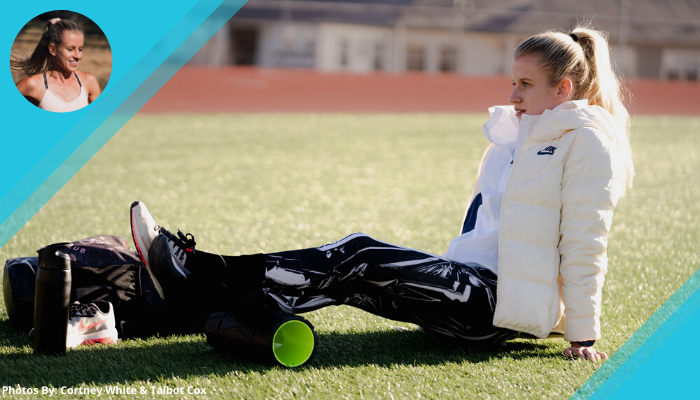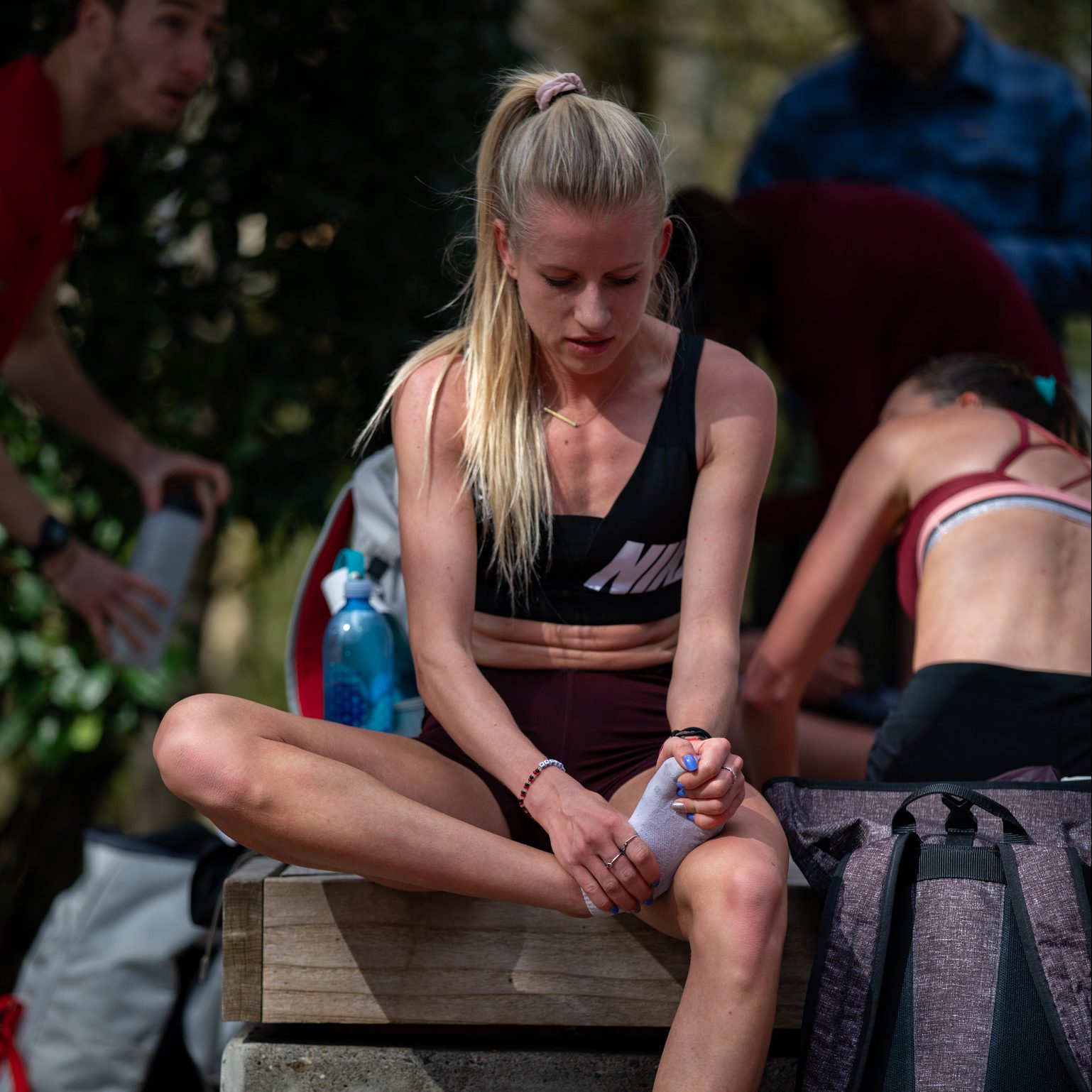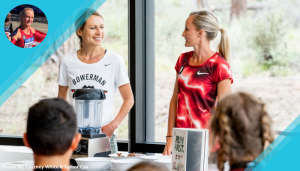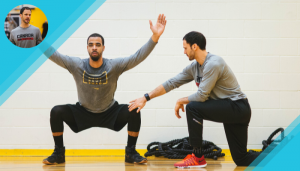Recover Like: American Record Karissa Schweizer


By: Recover-Zone Team
Our amazing team consist of a wide variety of writers, from novice athletes, to serious competitors. Competing in an array of fitness challenges.
There are a select few of young professional athletes whom you expect to have a bright future they have ahead of them. Karissa Schweizer is one of those athletes. Making her mark as an NCAA champion, Karissa had already proven herself before joining one of the top women running teams in America. How did she fare in the big leagues? Well, let’s just say after moving up to the next level, Karissa didn’t wait to run stride for stride with some of the best female runners in the world, she surpassed them.
With a track record like that, you might be wondering, how exactly did Karissa reach the level she’s obtained. In our interview, we cover all the details about her recovery, from foundational lessons she learned in high school, to the recovery tools that she’s stuck with along the way. If you’re looking for that one secret recovery tip to optimize your fitness…you might be surprised…it could be the little things that really add up.
Karissa, congratulation on such a great running career thus far, and thanks for taking the time to do an interview with us.
Your welcome…and thank you, my career has been a great experience this far.
Can you start by telling our readers what a typical training week looks like for you?
I would love too! Usually, my training week starts on Monday when I go out with my team, the Bowerman Babes, for an hour easy run. After the run, my team and I get in a nice weight-lifting session. Other than that, Monday is primarily focused on recovery. Tuesday’s is the team’s hard workout with the style of workout changing based on the week. Tuesdays can either be speed sessions, strength sessions, or specific sessions depending on the week. Usually, Tuesday’s workouts are pretty taxing on the body, so on Wednesday and Thursday, we go back to easy running. In addition to a morning run, on Wednesday’s I will run again in the afternoon, and on Thursday’s I will do core. Friday is another hard effort, and this workout is usually the toughest of the week. As you may have guessed, Saturday’s are easy, and then Sunday is our team’s long run. In total there are two hard efforts throughout the week, three if you include Sunday’s long run. Sometimes, when my legs are tired throughout the week, I lower my milage or take my long run extra easy to make sure I can hit the hard workouts. In reality, the week is scheduled so that I can be at my best for our hard workouts.
With all the tough training you’re doing, what do you do to recover throughout the day?
I’ll start with one of my staples, which is NormaTec’s recovery boots. They are easy to travel with and I especially love using them before big workouts or races. Alongside NormaTec, another cheaper option that I enjoy is Epson salt baths. Those seem to help relieve a lot of my aches and pains, as well as blisters which I tend to get a lot. In my recovery, I don’t overlook the simple stuff like getting a lot of sleep, drinking plenty of water, and a number of other little things. One principle of recovery that I have found to hold true is that when you are consistent with doing the little things, that most other people think are boring or tedious, you can actually prevent many injures and really end up benefiting your training a lot.
Moving now to the topic of your family. Knowing that your parents have a background in professional athletics, how has that affected how you approach your recovery?
I would say it comes down to the knowledge that my parents have shared with me. Throughout my young career, my parents really helped in my recovery by holding me back. Some parents, and many athletes, assume that when runners are in high school they should run a bunch of miles and do all sorts of hard workouts. Thankfully, my parents knew that I had a future in running so they chose to do what was best for my future, which was holding me back. In high school, I would constantly hear from my parents that I needed to lower my mileage and have fun. They were very big on making sure that I was enjoying the sport of running and they didn’t want me to push too hard when I was still in high school. Looking back on those times now, I see that they were doing the right thing.
Was it hard to take this advice from your parents in high school?
Yes, I would defiantly say that in high school my focus was on being the best I could be at the moment. Since I wasn’t necessarily focused on the long term, it was pretty hard for me to listen to my parent’s advice. In full honesty, it was great that I had my grandfather who had coached for around 15 years at my high school. Being that he was a coach, I really found trust in what he had to say. Often times I would call him up after talking with my parents and get his advice. Usually, whatever he recommended, I would go with, and I asked for his advice on everything. Fortunately, he was on the same page as my parents and really encouraged me to keep my training easier. My grandfather was a very positive influence for me and helped me realize that I would be able to build up my training throughout the years if I was I patient in high school.

"In my recovery, I don’t overlook the simple stuff like getting a lot of sleep, drinking plenty of water, and a number of other little things."
Is there any other advice your parents gave you in high school that was helpful to you?
Looking back, I would probably say that it came down to my parents keeping me from running whenever I had a little injury or growing pains. When I was in high school I had quite a few issues with my knees and my parents were firm that anytime I wasn’t feeling right I need to take a day or train easy. Ultimately, this was what I believe helped me stay injury-free. I couldn’t see it at the time, but now I realize that sometimes you have to take a few little steps back so that you can take more steps forward. Like I said, in high school, I hated taking days off, but now I’m really grateful that my parents forced me to do that because I have been able to string together a bunch of years of hard work, without being plagued with injuries.
It sounds like you had a great base of recovery knowledge going into college. Did your recovery change when you started running for your alma mater Missouri?
Going into college, I felt very prepared to train smart with the knowledge that I learned in high school. Having an understanding of when I needed to train hard and when I needed to rest, definitely paid off. Ultimately, staying true to what I learned in high school is what I believe really helped me go my entire college career without any major injury or setback. All of that said, when I got to college, the way I trained and recovered definitely changed. Two major changes that initially come to mind were that in my training my milage increased a lot, and that for my recovery, I had many more tools available. For example, Missouri issued every member of the team foam rollers, bands, and stuff like that. In addition to those recovery tools, we had a big training room where I could get massages and use the NormaTec boots if I needed them. Another thing that I began utilizing in college was a treadmill called the AlterG. Basically, an AlterG is an Anti-Gravity treadmill that can help you keep from pounding your body too much. I would run on the AlterG once a week to help offload some of the milages my legs were putting in. Thinking back to my time at Missouri, there were so many resources to recovery, you almost had to try to get injured.
In addition to all the recovery options available, how did your college coach work with you on recovery?
My coach was very open to letting each athlete do whatever they needed to recover. One way he did this was by having a great sense of when I needed a break. For example, even after a big performance like the SEC regional meet he would often have me take one day completely off so that I could have a mental break and physical break. Overall, my coach’s freedom and his input definitely helped my recovery a lot while I was in college.
Now that you have moved on from college, what do you do to recover being apart of the professional running team, the Bowerman Babes?
Well first, running is a full-time job now, so I focus on recovery even more than I did in high school or college. Certain activities like not having to walk to classes and not having the stress of school may seem like small things, but they really opened up my entire day for more training and recovery. With that said, now that I have a full day to recover, it really just comes down to being smart about recovery. One example of this is when our team is at altitude camp. When we’re training there I schedule time in my day where I can just be in bed taking a nap or gearing up for the next workout. I have noticed that when I do this, I am able to recover pretty well from workout to workout. Normally I feel good on workout days, which is actually hard to do in our training plan. At times, it’s easy to dig your own grave, and sometimes it’s hard to come out, but I’ve noticed if I’m able to load up on recovery and if I take my easy days extremely easy, that I usually am ready for my hard workouts. Another key that I have learned from being a pro is that I need to stay true to my body. Some athletes are able to go hard on their easy days and they’re still ready for their hard workouts, while other athletes need to go super easy on their recovery days to be ready for hard workouts. Everyone is a little different. So that’s why I listen to my body and adjust my workouts accordingly.
That’s a great team strategy for training, but how do you go about workouts when you are not feeling good on the day of a hard workout?
Usually, when it comes to a hard workout day and someone is not feeling good warming up, our coach just has us grind through the workout. I remember tons of workouts when I would tell my coach Jerry, that my legs felt dead. Or something like, I couldn’t do the workout because I wasn’t able to recover enough. Typically, he would respond by reminding me that I was in a fall or winter base training so my legs weren’t supposed to feel good. Over time I have gotten used to running my hard workout, whether I feel like it or not. Honestly, this mentality is nice since in the future I might have a race when my legs are feeling awful and I’m going to have to be able to cope with how I’m feeling and still run well.
Follow Karissa

Thinking back to your parents, do they play any part in your recovery now that you’re a professional runner?
Yes and no. My parents definitely have a ton of energy. Sometimes when I come home, they want to do a bunch of different things and I have to tell them, that I’m running so much that I don’t have the energy for everything they want to do. My parents are very understanding though, especially when I tell them I need a break. Another aspect of helping with my recovery is just being able to talk with my parents on the phone when I’m training away from home. It’s not that I’m asking them what to do for training, but actually just explaining to them the training I’m doing at the moment because they love to hear all about it.
Now that you’re a pro runner, you probably have the ability to get whatever recovery product you want, but do you have any simple recovery tools that you use?
Simple answer, the basic foam roller. Personally, I see a lot of benefits in just rolling out before runs. I always travel with a foam roller, and everyone on our team always counts on me to have one. I literally bring my foam roller everywhere I go. I use it before big races, before workouts, and so much so that sometimes I feel like I live on a foam roller. I actually use different types of foam rollers too. There is the sphere foam roller, the foot roller and I even enjoy a product called Roll Recovery.
Something we haven’t touched on yet is nutrition. What is your fueling strategy for recovering?
This reminds me of another key that my parents pressed upon me while I was growing up, and that food is fuel. If I’m running a lot, I need to eat a lot. I never try to limit my caloric intake at the expense of under fueling myself. In addition to thinking of food as fuel, Shalane Flanagan, one of the coaches on our team, has really helped our group with nutrition and recovery. Shalane knows the importance of fueling your body and has even written two cook books. One is called Run Fast. East Slow. and the other is called Run Fast. Cook Fast. Eat Slow. I think a lot of athletes, especially female athletes, don’t realize that you can see short term success when you under fuel, but the long term outlook for this approach is not good. Oftentimes it’s the runners with this approach that you don’t hear about anymore.
I would say that it’s very important to be consistent with fueling properly if I want to stay injury-free. Usually, I don’t cut back on many foods since I’m working to sustain myself, and I know what healthy options I like to eat. Don’t get me wrong, I eat a ton of desserts because, for me, it’s important to have moderation. In the past when I’ve tried cutting out sweets, I end up eating other things to please my sweet tooth, so I’ve found that moderation, and not necessarily restricting yourself, is important for training. I’ve come to learn that eating a cookie or a little piece of cake is not going to hurt me, and something that my teammates also understand.
Let’s dive a little deeper into what a day of eating looks like for you. What do you eat and when?
This is easy because typically, I’m just a creature of habit. My thinking is, I know what I like, so I just keep eating those same things. To answer the question, oftentimes, in the morning, I eat oatmeal with some peanut butter and bananas. That serves as my first breakfast before I go running. After I get back from my run, I usually eat brunch with a bagel, cream cheese and jelly as well as eggs with some kind of meat and veggies in them. I also eat some fruit alongside that. I like breakfast a lot, so that’s why I eat breakfast foods twice a day. Then, throughout the day, I typically eat a snack or secondary lunch, especially when I’m in hard training. I like drinking a smoothie or eating whatever else I find in the pantry. Dinner is the one meal that I do change up to or at least try to. My dinner choice really comes down to whatever workout I have coming up. When big workouts are next, I like to have carbs in the form of a pasta dish. On long run days, I like to have some sort of red meat. For some reason, my body craves red meat on these days, and whenever my body is craving something such as this, I try to bulk up on that. This goes back to listening to my body. My main focus is making sure that I have carbs, proteins, and some sort of veggies in my meal so that I can have a balance with my nutrition.
With everything you’ve said in mind, what is the number one tip you could give our readers?
Being a professional runner, I have a lot of access to all the nice recovery tools, but what I have found to be true for me was, and is, staying on top of the little things. People don’t realize how important the simple acts of sleeping, drinking water, eating healthy, and other recovery activities are. I have found that the little things really add up over time. Just being consistent with the little things is how you can have breakthroughs.
Wrapping things up, is there anything else you would like to add?
I’ll just say it one more time, doing the basic stuff like foam rolling, Epson salt baths, ice baths, and other recovery activities can make all the difference in the long run.



